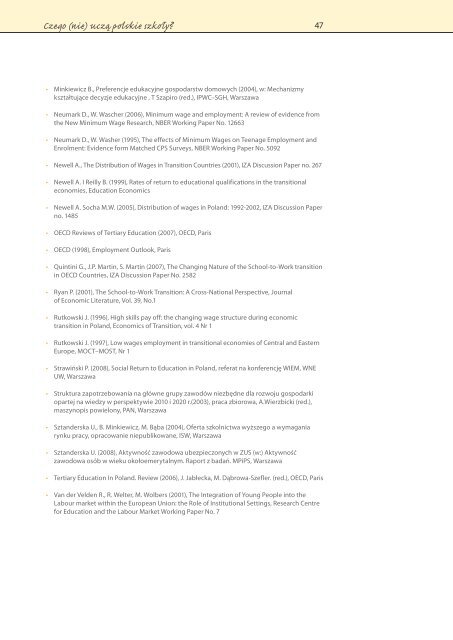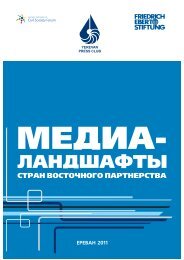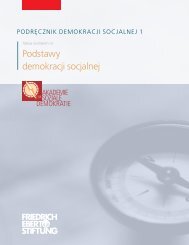Czego (nie) uczÄ polskie szkoÅy? - Fundacja im. Friedricha Eberta
Czego (nie) uczÄ polskie szkoÅy? - Fundacja im. Friedricha Eberta
Czego (nie) uczÄ polskie szkoÅy? - Fundacja im. Friedricha Eberta
- No tags were found...
Create successful ePaper yourself
Turn your PDF publications into a flip-book with our unique Google optimized e-Paper software.
<strong>Czego</strong> (<strong>nie</strong>) uczą <strong>polskie</strong> szkoły? 47• Minkiewicz B., Preferencje edukacyjne gospodarstw domowych (2004), w: Mechanizmykształtujące decyzje edukacyjne , T Szapiro (red.), IPWC–SGH, Warszawa• Neumark D., W. Wascher (2006), Min<strong>im</strong>um wage and employment: A review of evidence fromthe New Min<strong>im</strong>um Wage Research, NBER Working Paper No. 12663• Neumark D., W. Washer (1995), The effects of Min<strong>im</strong>um Wages on Teenage Employment andEnrolment: Evidence form Matched CPS Surveys, NBER Working Paper No. 5092• Newell A., The Distribution of Wages in Transition Countries (2001), IZA Discussion Paper no. 267• Newell A. I Reilly B. (1999), Rates of return to educational qualifications in the transitionaleconomies, Education Economics• Newell A. Socha M.W. (2005), Distribution of wages in Poland: 1992-2002, IZA Discussion Paperno. 1485• OECD Reviews of Tertiary Education (2007), OECD, Paris• OECD (1998), Employment Outlook, Paris• Quintini G., J.P. Martin, S. Martin (2007), The Changing Nature of the School-to-Work transitionin OECD Countries, IZA Discussion Paper No. 2582• Ryan P. (2001), The School-to-Work Transition: A Cross-National Perspective, Journalof Economic Literature, Vol. 39, No.1• Rutkowski J. (1996), High skills pay off: the changing wage structure during economictransition in Poland, Economics of Transition, vol. 4 Nr 1• Rutkowski J. (1997), Low wages employment in transitional economies of Central and EasternEurope, MOCT–MOST, Nr 1• Strawiński P. (2008), Social Return to Education in Poland, referat na konferencję WIEM, WNEUW, Warszawa• Struktura zapotrzebowania na główne grupy zawodów <strong>nie</strong>zbędne dla rozwoju gospodarkiopartej na wiedzy w perspektywie 2010 i 2020 r.(2003), praca zbiorowa, A.Wierzbicki (red.),maszynopis powielony, PAN, Warszawa• Sztanderska U., B. Minkiewicz, M. Bąba (2004), Oferta szkolnictwa wyższego a wymaganiarynku pracy, opracowa<strong>nie</strong> <strong>nie</strong>publikowane, ISW, Warszawa• Sztanderska U. (2008), Aktywność zawodowa ubezpieczonych w ZUS (w:) Aktywnośćzawodowa osób w wieku okołoemerytalnym. Raport z badań. MPiPS, Warszawa• Tertiary Education In Poland. Review (2006), J. Jabłecka, M. Dąbrowa-Szefler. (red.), OECD, Paris• Van der Velden R., R. Welter, M. Wolbers (2001), The Integration of Young People into theLabour market within the European Union: the Role of Institutional Settings, Research Centrefor Education and the Labour Market Working Paper No. 7








